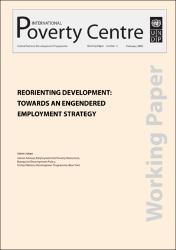Please use this identifier to cite or link to this item:
https://repositorio.ipea.gov.br/handle/11058/15631Full metadata record
| DC Field | Value | Language |
|---|---|---|
| dc.contributor.author | Jahan, Selim | |
| dc.date.accessioned | 2024-10-04T00:02:28Z | - |
| dc.date.available | 2024-10-04T00:02:28Z | - |
| dc.date.issued | 2005 | |
| dc.identifier.uri | https://repositorio.ipea.gov.br/handle/11058/15631 | - |
| dc.description.abstract | Development strategies, in the name of gender-neutral, are gender-blind. The gender blindness of development strategies are derived from the gender-insensitiveness of dominant development paradigms, which, in the name of work, do not make any distinction between productive and reproductive work and does not differentiate, in the name of household, the asymmetries faced by its different members on the basis of sex. Given the nature of gender blindness of development strategies, it is clear that issues related to work and employment are at the core of it. For example, if work done by women within households and for the care economy continues to be not properly valued and compensated for, development strategies would be biased against women. If labour supply functions continue to exclude the trade-off between productive and reproductive functions of women, employment strategies would be partial. The failure to recognize the differentiated position of women within households in terms of opportunities also has adverse implications on work, employment and incomes of women. Female employment is crucial for equitable growth and poverty reduction. Enhanced female employment and income also contribute to better priority setting and resource allocation within families, as women are more prudent. Women, however, have been found to be concentrated in lowpaying, low productive jobs, they account for major part of temporary, part-time and precarious employment. An employment-friendly strategy is not necessarily gendersensitive. Engendering employment strategy would require reorienting the macro policies, the incentive mechanisms and catering to specific needs of women as they juggle between their productive and reproductive roles, and protecting their rights and safety as workers. | en |
| dc.language.iso | en | |
| dc.title | Reorienting development: towards an engendered employment strategy | en |
| dc.type | Working Paper | |
| dc.rights.holder | International Policy Centre for Inclusive Growth | |
| dc.rights.holder | United Nations Development Programme | |
| dc.location.country | Brasil | |
| dc.description.physical | 19 p. : il. | |
| dc.rights.type | Licença total exclusiva | |
| dc.rights.license | O texto e dados desta publicação podem ser reproduzidos desde que as fontes sejam citadas. Reproduções com fins comerciais são proibidas. | |
| dc.subject.keyword | Development | |
| dc.subject.keyword | Gender | |
| dc.subject.keyword | Poverty | |
| dc.subject.keyword | Economic policies | |
| ipea.access.type | Acesso Aberto | |
| ipea.researchfields | N/A | |
| ipea.classification | Emprego. Trabalho | |
| ipea.classification | Desenvolvimento Social | |
| ipea.classification | Economia. Desenvolvimento Econômico | |
| Appears in Collections: | Publicações do IPC-IG | |
Files in This Item:
| File | Description | Size | Format | |
|---|---|---|---|---|
| en_IPCWorkingPaper5.pdf | 218.39 kB | Adobe PDF |  View/Open |
Items in DSpace are protected by copyright, with all rights reserved, unless otherwise indicated.

